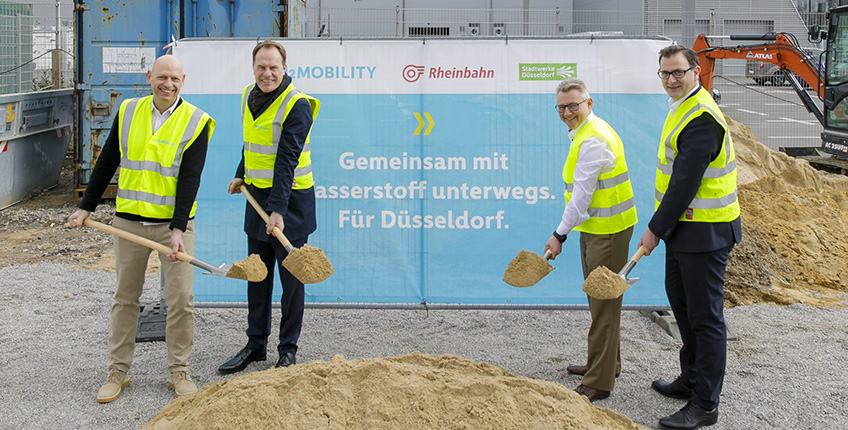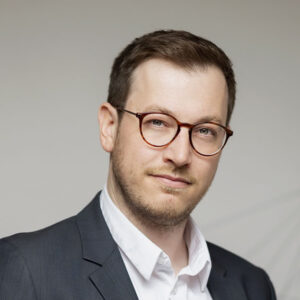With a symbolic ground-breaking ceremony, H2 MOBILITY Deutschland, Stadtwerke Düsseldorf and Rheinbahn start the construction phase of a high-capacity hydrogen refuelling station for the state capital in the presence of Mayor Dr. Stephan Keller. Commissioning is planned for the second half of the year. The project is made possible by the value-adding cooperation between the three partners.
With a daily capacity of two tons, the hydrogen refuelling station will offer ten times the capacity of today’s conventional H2 stations and cover the daily requirements of up to 100 fuel cell buses and trucks. Thanks to patented high-performance technology, up to three vehicles can be refuelled at the same time—including trucks and buses (350 bar) as well as cars and light commercial vehicles, i.e. waste collectors (700 bar).
“The start of construction for the first high-performance hydrogen refuelling station in Düsseldorf is a further step towards climate neutrality in 2035. I expressly welcome the fact that Rheinbahn and Stadtwerke are leading the way in cooperation with H2 MOBILITY to promote climate protection in the transport sector. Buses and trains are the backbone of changing mobility behavior. In addition to the expansion of public transport, however, we also need continuous optimization of drive types in this sector. The use of hydrogen and electric buses in the Rheinbahn fleet and the expansion of the associated infrastructure is a benefit for climate protection, air pollution control and modern mobility in the state capital of Düsseldorf. The commitment of the players involved in this project is exemplary,” emphasizes Mayor Dr. Stephan Keller.
Hydrogen: an important component in achieving climate protection targets
The state capital of Düsseldorf wants to become climate-neutral by 2035, including in the transport sector. This is why Stadtwerke Düsseldorf and Rheinbahn are cooperating with the experienced hydrogen refuelling station operator H2 MOBILITY Deutschland. Together, the partners are creating a fertile ecosystem along the hydrogen value chain.
Stadtwerke Düsseldorf is investing in an electrolyzer to be able to produce climate-friendly hydrogen on site in the future. Rheinbahn is procuring 20 fuel cell buses as part of the conversion of its fleet to climate-friendly drives. 10 buses have already been delivered and a further 10 buses are on order. H2 MOBILITY Deutschland is building a public hydrogen refuelling station where all fuel cell vehicles can refuel with renewable hydrogen.
“The construction project shows that municipal partnerships along the value chain – from hydrogen production to infrastructure – have an accelerating effect on the realization of the transport transition. This hydrogen refuelling station serves local public transport, heavy goods vehicles from local businesses and private cars. Thanks to our patented refuelling technology, high-performance refuelling of several buses and trucks in a row at at least three dispensers is possible at the same time. As a result, Rheinbahn and many other customers are already benefiting this year from the latest technology and the advantages of hydrogen propulsion – short refuelling times with a long range,” explains Frank Fronzke, Managing Director and COO at H2 MOBILITY Deutschland.
Climate-friendly hydrogen for mobility
From 2026, climate-friendly hydrogen will be produced by an electrolyzer that will be built on the premises of Stadtwerke Düsseldorf and delivered from there to the refuelling station on the neighboring property via pipeline. The electricity for the electrolyzer will be produced at Stadtwerke’s waste combustion plant. This creates a cycle: The energy for the public hydrogen refuelling station is obtained from the city’s waste.
“We are working consistently on implementing our strategy for achieving climate protection targets and continuously improving the quality of life in Düsseldorf as a business location. The investment in hydrogen technology is another important step towards achieving this goal and shows that we can expand infrastructures in such a way that the mobility sector can also make its contribution to achieving the 2035 climate protection target,” says Julien Mounier, Chairman of the Board of Stadtwerke Düsseldorf.
Rheinbahn Chairman of the Supervisory Board Michael Richarz adds: “Rheinbahn stands for mobility and climate protection and is therefore an important partner for achieving the climate targets and for a city worth living in. In view of the City of Düsseldorf’s goal of being climate-neutral by 2035, we are working at full speed to convert our entire bus fleet to emission-free drives and the related infrastructure. In addition to using battery-electric buses, we are currently also gaining experience with hydrogen drive technology. Thanks to the cooperation with H2 MOBILITY and with Stadtwerke Düsseldorf, we will be able to refuel our first 20 hydrogen buses with hydrogen in the direct neighborhood of our depot in Lierenfeld.”
The Düsseldorf-Höherweg hydrogen refuelling station (HyLight3) project is being funded by the Federal Ministry for Digital and Transport Affairs (BMDV) with a total of 3,137,000 EUR as part of the funding guideline for market activation measures under the National Innovation Program Hydrogen and Fuel Cell Technology Phase 2 (NIP2). The funding guideline is coordinated by NOW GmbH and implemented by Projektträger Jülich (PtJ).
Pioneer in Europe: H2 MOBILITY station network
Currently, fuel cell vehicles can refuel at 700 bar at over 80 public H2 MOBILITY refuelling stations in Germany, including passenger cars and smaller commercial vehicles as well as waste collectors. Five additional refuelling stations are in the planning, construction, or commissioning stages. Refuelling at 350 bar is possible for buses and trucks at 15 stations. Further expansion will be demand-driven, including along the TEN-T corridors for commercial vehicles. 27 refuelling options for 350 bar are currently being implemented.
Contact:
H2 MOBILITY Deutschland: Daniela Dietz,
Further information at www.h2-mobility.de
Image rights: Stadtwerke Düsseldorf


